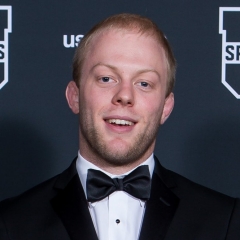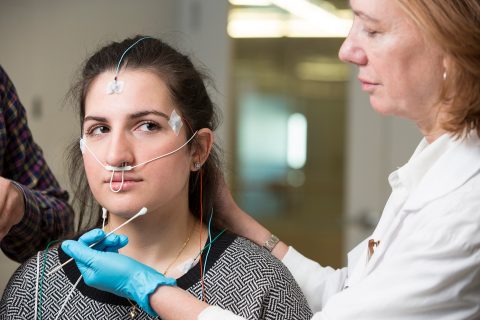Psychology (BA, BSc)
Virtual information sessions
Discover what makes Concordia's Faculty of Arts and Science stand out as a leader in the humanities and social and natural sciences, including academic opportunities, hands-on learning and how to achieve your goals.
Why study Psychology?
Modern scientific psychology studies brain processes and behaviour — both human and animal — under various conditions. Psychologists study the relationships between the brain and behaviour: the processes that determine how we learn to speak, create and keep memories, or respond to stress. When you study psychology, you examine the internal and external factors that influence development, cognition, perception and motivation.
All Psychology students follow a core psychology curriculum. Regardless of your program you’ll also:
- Receive fundamental training in statistics and research methods
- Learn the basic principles of behavioural neurobiology
- Study the history of psychology
A Psychology degree opens many doors; specialization or honours students may choose to work as a psychologist, therapist, or pursue graduate studies or medical research. Students majoring in Psychology can complement their studies in other fields such as business, communications or education.
Program highlights
- Program covers the five main areas of psychology: Social, developmental, clinical, neuroscience, and cognition
- Accredited by the OPQ/CPA; students can take the required courses to qualify for clinical graduate programs in Quebec and the rest of Canada
- Opportunities to get involved in active research labs In-house advising tailored to students in the Psychology program
Special funding for out-of-province students
Up to $4000 for undergraduate programs.
Program structure
A Bachelor of Arts or Science degree takes a minimum of three or four years (90 – 120 credits) of full-time study, depending on your academic background.
Program options
- Honours in Psychology (66 credits)
Students seeking admission to the Honours program should speak with their program advisor in their first year of study at Concordia. Students apply to the departmental Honours advisor, normally following the completion of 30 credits. Students applying to the University are able to apply to the major or specialization. - Specialization in Psychology (60 credits)
This program is similar to the BA Honours program, but without research experience in psychology, the Honours seminars and the Honours thesis. The number of electives at the intermediate or advanced level in psychology is increased to 12, for a total of 60 psychology credits, leaving 30 open elective credits, 24 of which should be in departments other than Psychology (6 of which must be General Education credits). - Major in Psychology (42 credits)
The major is relevant for someone seeking a good general degree which could have applications in a variety of fields related to teaching, business, personnel, or community involvement.
Courses
United States students: A U.S. Federal Student Aid-eligible version of this program is offered. This version meets all U.S. regulations (such as no co-operative education or e-courses) for eligible programs.
Admission criteria
Minimum cut-off averages and course requirements
- Quebec CEGEP: 27.5
- Calculus 1 and Calculus 2 – Mechanics, Electricity and Magnetism and Wave, Optics and Modern Physics – General Chemistry and Chemistry of Solutions – General Biology OR Natural Science DEC OR DEC intégré en sciences, lettres et arts.
- Additional information for CEGEP applicants
- High School: B overall, B in math / sciences
- Completed courses in the disciplines of Calculus, Biology, Chemistry and Physics.
- One math from Pre-Calculus, Calculus, or equivalent
- Two sciences (from Biology, Chemistry or Physics)
- ACT or SAT is NOT required
- Canadian curricula course requirements
- Accepted international qualifications
- Completed courses in the disciplines of Calculus, Biology, Chemistry and Physics.
- International Baccalaureate (IB) diploma: 29 overall, 4 HL or 5 SL math, 5 HL science
- one math (Applications and Interpretations HL, Analysis and Approaches HL or Analysis and Approaches SL)
- one science (Physics, Chemistry or Biology, either SL or HL)
- one of the math or science courses must be completed at the HL level
- International Baccalaureate Career-related Programme (CP): 29 overall, 4 HL or 5 SL math, 5 HL science
- Same as International Baccalaureate Diploma Programme (DP) requirements
- Additional Career-related Programme (CP) course requirements
- Baccalauréat français: 13 overall, 13 in math / science
- Première: Spécialité mathématiques AND Spécialité physique-chimie
Terminale: Spécialité mathématiques (also accepted, Spécialité Physique-Chimie AND Mathématiques Complémentaires)
- Première: Spécialité mathématiques AND Spécialité physique-chimie
- British system of education (GCE):
- A-levels: At least two A-level exams BB, B in math, B in science or
- AS-levels: At least 4 AS-level exams with equivalent results or
- BTEC: Level 3 Diploma or Extended Diploma in a related subject area with equivalent results
- Students without math or science A-levels may be admissible based on AS-level or iGCSE/GCSE/O-Level exam results. Students should include all their exam results from iGCSE (or equivalent) onwards to support their application.
- Additional information for British System of Education (GCE) applicants
- University Transfers (internal/external): B overall, B in math / sciences
- Completed courses in the disciplines of Calculus, Biology, Chemistry and Physics.
Minimum cut-off averages should be used as indicators. The cut-off data may change depending on the applicant pool. Applicants who meet the stated minimum requirements are not guaranteed admission to these programs.
Minimum cut-off averages and course requirements
- Quebec CEGEP: 27.5
- High School: B
- ACT or SAT is NOT required
- Canadian curricula course requirements
- Accepted international qualifications
- International Baccalaureate (IB) diploma: 29
- International Baccalaureate Career-related Programme (CP): 29
- Baccalauréat français: 13
- Math is not required for admission.
- British system of education (GCE):
- A-levels: At least two A-level exams BB or
- AS-levels: At least 4 AS-level exams with equivalent results or
- BTEC: Level 3 Diploma or Extended Diploma in a related subject area with equivalent results
- Additional information for British System of Education (GCE) applicants
- University Transfers (internal/external): B
Minimum cut-off averages should be used as indicators. The cut-off data may change depending on the applicant pool. Applicants who meet the stated minimum requirements are not guaranteed admission to these programs.
Application deadlines
It’s not too late to apply
Most undergraduate programs are still accepting applications for fall 2025.

FALL ENTRY (September)
Deadline: March 1
International applicants: Apply no later than February 1 to allow time for immigration document processing. However, applying earlier is strongly recommended. Immigration processing times vary by country, and delays could prevent you from starting your studies on time.

WINTER ENTRY (January)
Deadline: November 1
International applicants: Apply no later than August 1 to allow time for immigration document processing. However, applying earlier is strongly recommended. Immigration processing times vary by country, and delays could prevent you from starting your studies on time.
We reserve the right to close admission to a program at any time after the official deadline without prior notice.
After your degree
Honours and specialization graduates often pursue graduate studies. Others have established careers as medical professionals or youth counsellors. Depending on the selection of courses the specialization may also provide a background for graduate work such as a master’s degree in counselling psychology, or social work, or even in an MBA program.
The major program may have applications in a variety of fields related to teaching, business, personnel, or community involvement.
Student story

Francis Carter
Specialization in Psychology (Behavourial Neuroscience)
Doing research with a professor as an undergraduate is just one way that this program propels students into exciting careers.
Other programs of interest

When you study neuroscience, you’ll investigate the links between the chemical changes in the brain, emotions and behaviour.
Department
Faculty

Get inspired by life. Immerse yourself in the study of life at all levels: from the edge of biochemistry through cell biology and the physiology of multicellular organisms to the interactions between organisms and their environment.
Department
Faculty

The Concordia University Science College offers highly motivated students in any of the sciences a multidisciplinary science program that prepares you for a life of scientific thought and research.
Department
Faculty


